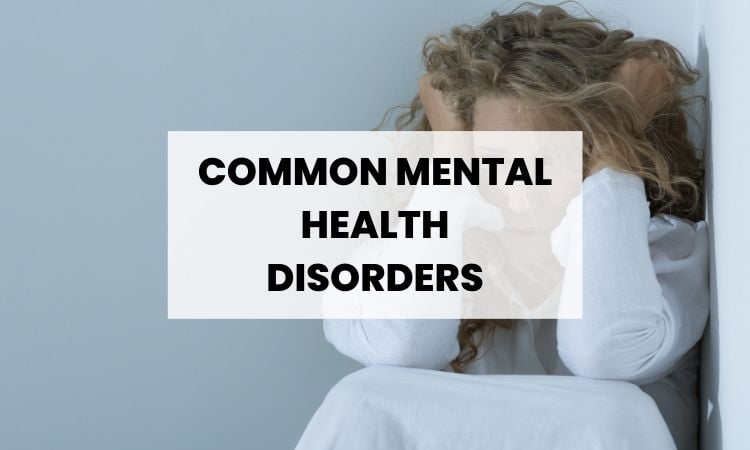Mental health disorders are very common, and many come with difficult symptoms. From anxiety to depression, these 10 disorders are the most encountered in a mental health setting, along with information on how they can be treated.
If you want to read about facial health and the food important for facial health, read this article.
Anxiety Disorders
One of the most common mental health disorders is an anxiety disorder. Anxiety disorders are among the most commonly encountered mental health disorders. There are five primary types, including generalized anxiety disorder (GAD), panic disorder, social anxiety disorder, obsessive-compulsive disorder (OCD) and specific phobias. Symptoms may include a racing heartbeat, excessive worrying, sleep disturbances and intrusive thoughts. Treatment can include cognitive behavioural therapy, relaxation techniques, lifestyle changes and medication.
Cognitive behavioural therapy (CBT) is a type of psychotherapy that has been shown to be effective in treating anxiety. It focuses on helping individuals identify, challenge and change the thought patterns and behaviours that lead to anxiety and distress. Relaxation techniques such as deep breathing exercises, meditation, guided imagery and progressive muscle relaxation can also be helpful in reducing symptoms of anxiety. Maintaining a healthy lifestyle by engaging in regular physical activity, avoiding substance use, getting adequate sleep and eating nutritious food is important for managing both physical and mental health. Additionally, some people find relief from medical treatment options such as antidepressants or anti-anxiety medications.

Post-Traumatic Stress Disorder (PTSD)
Another common mental health disorders is Post-traumatic stress disorder. It is an anxiety disorder caused by exposure to a traumatic event. People with PTSD may experience hyper-arousal, flashbacks and recurrent nightmares related to the trauma. Treatment for PTSD usually involves some form of psychotherapy combined with medication, such as anti-depressants or anti-anxiety drugs. Other forms of treatment include cognitive processing therapy, individual and group support and eye movement desensitization and reprocessing (EMDR).
Bipolar Disorder
Bipolar disorder, also known as manic-depressive illness, is a brain disorder that causes unusual shifts in mood, energy and activity levels. People with bipolar disorder experience alternating periods of intense elation or happiness, known as manic episodes, followed by periods of depression. Treatment usually involves medications like mood stabilizers and antipsychotics as well as psychotherapy.
Most people with bipolar disorder require long-term treatment, often for the rest of their lives. However, proper management of the condition can significantly improve the quality of life and reduce the severity of symptoms. Cognitive behavioural therapy (CBT) is particularly effective in helping people with bipolar disorder manage their mood swings as well as develop thought patterns and behaviour habits that enable them to maintain stability and improve mental health. Medications like antidepressants may be headed to help alleviate depressive symptoms.
Depression
Depression is a common yet serious mental disorder that causes persistent feelings of sadness and worthlessness, and can even lead to physical health issues. Those experiencing depression may also feel exhaustion, difficulty concentrating and disturbed sleep patterns. Effective treatments include cognitive behavioural therapy (CBT), anti-depressant medications, and lifestyle changes such as regular exercise.
It is important to seek help if you are feeling symptoms of depression. Your general practitioner should provide an initial assessment to identify if you have MDD (Major Depressive disorder) or another type of mental health disorder. If they determine that you have depression, they will discuss appropriate treatment options including CBT, anti-depressant medications and lifestyle changes such as regular exercise. In some cases, your doctor may refer you to a counselling service for more specialised treatments.
Attention Deficit Hyperactivity Disorder (ADHD)
Attention Deficit Hyperactivity Disorder (ADHD) is a disorder that affects children and adolescents and is characterised by a persistent pattern of inattention, hyperactivity, and impulsivity. It can interfere with school performance, social interactions, and relationships. Treatment for ADHD usually involves a combination of medication and behavioural therapy.
ADHD is a chronic condition with no cure, but it can be managed through regular medical care, lifestyle changes, and other treatments and therapies. Medications such as stimulants and non-stimulants can help to reduce hyperactivity and impulsive behaviour, while behavioural therapy can help individuals learn effective strategies for managing symptoms. Additionally, cognitive-behavioural therapy may be recommended to help individuals develop coping skills to better manage their thoughts, behaviours and emotions. Other treatments like physical activity and nutrition can also benefit those with ADHD by improving their mood and overall health.





![Apple iPhone 17 Release Date, Features & Price [Leaked Info] Apple iPhone 17 Release Date, Features & Price [Leaked Info]](https://newslounges.com/wp-content/uploads/2025/05/iPhone-17-Pro-Dual-Tone-Rectangle-Feature-1-218x150.jpg)






